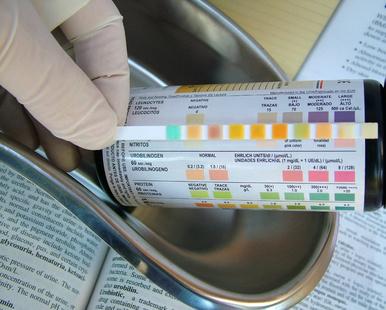Diseases and conditions can mar the celebration of the baby’s arrival. One such condition for during pregnancy is toxemia. According to WebMD, toxemia, also known as preeclampsia or pregnancy-induced hypertension (PIH), is a condition caused by toxic substances present in the blood that come from infectious bacteria, toxins and other noxious substances. Toxemia can prevent blood from entering the placenta, thereby causing serious harm to the baby. Recognizing the signs and symptoms of toxemia can prevent serious complications and ensure the safety of both you and your baby.
High Blood Pressure
If your blood pressure surges to 140/90 or more after week 20 of your pregnancy, it may be a sign of toxemia, especially when you have never had high blood pressure before. According to WebMD, if results are still high with a systolic blood pressure of 140 mm Hg or more and/or diastolic blood pressure of 90 mm Hg or more, after taking two measurements at least six hours apart, your doctor may request additional tests to confirm toxemia. If you are having severe toxemia, your systolic blood pressure may reach 160 mm Hg or more and/or diastolic blood pressure may reach 110 mm Hg or more.
The Preeclampsia Foundation also recommends watching closely if your systolic pressure reaches 30 mm Hg or more and diastolic pressure reaches15 mm Hg or more even if your blood pressure is below 140/90.
Sudden Weight Gain
Unexplained rapid weight gain of 2 lbs. in a week or at least 6 lbs. in a month is another sign of toxemia, if you are not eating more than usual, according to the Preeclampsia Foundation.
Severe Swelling of Hands and Face
Water retention or edema is common among pregnant women. It may, however, be a sign of toxemia when the swelling that accumulates in the face (eyes) or hands does not go away. According to WebMD, looking for this symptom helps determine if you are suffering from toxemia when other symptoms are also present.
Headaches That Won’t Go Away
Frequent bouts of throbbing headaches (migraine-like) that don’t seem to go away may be a sign of toxemia, especially after you have already taken over-the-counter (OTC) medication. Call your doctor immediately if light sensitivity accompanies your headaches.
Vision Disturbances
If you experience double or blurred vision as well as dimming, appearances of spots in the visual field and/or periods of blindness, you may be developing preeclampsia. If you are far-sighted and your vision suddenly improves, it may also be a sign of toxemia, according to Preeclampsia Foundation. Take these symptoms seriously because they may also be signs of brain edema.
Low Protein Output and Proteinuria
You may have toxemia if you urinate a lesser amount than usual (less than 2 cups in 24 hours) or if you are not urinating at all. If your urine test yields the presence of protein, also known as proteinuria, it is also a sign of severe preeclampsia.
Rapid Heartbeat, Difficulty in Breathing, Mental Confusion
Call your doctor if you are experiencing rapid heartbeat, rapid pulse, confusion, heightened sense anxiety and difficulty in breathing, especially when lying flat. These may be signs of toxemia if you are experiencing them for the first time.
HELLP Syndrome
HELLP syndrome stands for H (hemolysis), EL (elevated liver enzymes) and LP (low platelet count). It affects 10 percent of pregnant women with preeclampsia or eclampsia, according to the National Institutes of Health. In some cases, women who do not show the other symptoms of preeclampsia may already have HELLP but have been misdiagnosed as other conditions, such as liver and gall bladder diseases. Warning signs of HELLP include headache, nausea and vomiting that continue to get worse, upper abdominal pain, vision problems and upper right abdomen, shoulder and neck pain.
Photo Credit
- urine test image by Keith Frith from Fotolia.com





